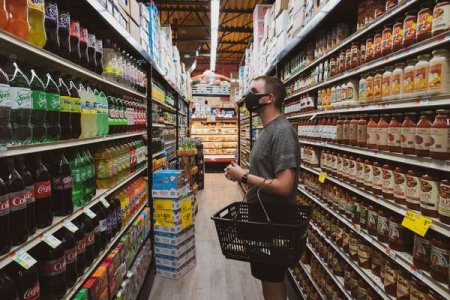Unlock the secret to saving thousands by understanding this one food label!
Surveys consistently reveal that the cost of living, particularly grocery expenses, rise annually.
But don't worry, despite the high prices, there are numerous opportunities to save money while shopping for food. It may require some research and careful thought, but it's definitely achievable.
One effective way to start saving is by understanding the information presented on food labels. Believe it or not, this knowledge can potentially save you thousands of dollars annually.

Have you ever noticed those tiny numbers imprinted on the plastic wrap or packaging of your fruits and vegetables, canned goods, and other items? Those numbers hold valuable information about the safety and shelf life of the food.
Consumer confusion regarding the two types of dates found on food labels—the 'best before' and 'use-by' dates—is a significant contributing factor to what is commonly referred to as 'household food waste’. This occurs when consumers discard perfectly edible groceries mistakenly.
Recent research conducted by Wrap and Mayonnaise brand Hellmans in Australia revealed that one in three households wastes the equivalent of a full shopping bag of food every week. This wastage amounts to a staggering cost of over $2000 per year.
Differentiating between the two types of dates on food labels is a relatively simple yet effective method of reducing waste and saving money.

It is crucial to adhere to the use-by date, as expired foods can pose a risk to your well-being and may lead to food poisoning. It is essential to discard any food items that have exceeded their use-by dates and avoid cooking, freezing, or consuming them.
'It may not be unsafe to eat a food past its best before date; you may simply notice that some of its quality, flavour or texture has been lost,' Woolworths explained.
'As with use-by dates, following the food’s storage instructions ensures an item retains its quality for as long as possible.'
This means that watching out for these best-before dates could be a great way to keep that weekly grocery bill lower.
 We suggest making it a habit to check all your food items’ labels and to use a ‘better safe than sorry’ philosophy when it comes to understanding and using expiry dates.
We suggest making it a habit to check all your food items’ labels and to use a ‘better safe than sorry’ philosophy when it comes to understanding and using expiry dates.
Being more conscious of what it means to ensure you’ve got food that’s safe and well-preserved can certainly help curb your grocery expenses in the long term.
Make sure to experiment and become more aware the next time you head to the supermarket to shop!
But don't worry, despite the high prices, there are numerous opportunities to save money while shopping for food. It may require some research and careful thought, but it's definitely achievable.
One effective way to start saving is by understanding the information presented on food labels. Believe it or not, this knowledge can potentially save you thousands of dollars annually.

Food labels contain valuable information that, if not properly understood, could be costing you thousands of dollars each year. It's time to learn how to read those labels and make informed choices to save money. Image by atoms from Unsplash
Have you ever noticed those tiny numbers imprinted on the plastic wrap or packaging of your fruits and vegetables, canned goods, and other items? Those numbers hold valuable information about the safety and shelf life of the food.
Consumer confusion regarding the two types of dates found on food labels—the 'best before' and 'use-by' dates—is a significant contributing factor to what is commonly referred to as 'household food waste’. This occurs when consumers discard perfectly edible groceries mistakenly.
Recent research conducted by Wrap and Mayonnaise brand Hellmans in Australia revealed that one in three households wastes the equivalent of a full shopping bag of food every week. This wastage amounts to a staggering cost of over $2000 per year.
Differentiating between the two types of dates on food labels is a relatively simple yet effective method of reducing waste and saving money.

Food labels provide crucial details about the product, including ingredients, nutritional information, and serving sizes. Image by boxedwater from Unsplash
Use-by date
The use-by date is typically found on perishable foods such as pre-packaged meals or protein products. According to Woolworths, a use-by date indicates the deadline for consuming a food item for health and safety reasons.It is crucial to adhere to the use-by date, as expired foods can pose a risk to your well-being and may lead to food poisoning. It is essential to discard any food items that have exceeded their use-by dates and avoid cooking, freezing, or consuming them.
Best-before date
On the other hand, a best-before date pertains to the quality rather than the safety of the food. This date is commonly found on non-perishable items like canned goods, dry goods, fruits, and vegetables.'It may not be unsafe to eat a food past its best before date; you may simply notice that some of its quality, flavour or texture has been lost,' Woolworths explained.
'As with use-by dates, following the food’s storage instructions ensures an item retains its quality for as long as possible.'
This means that watching out for these best-before dates could be a great way to keep that weekly grocery bill lower.
Key Takeaways
- Understanding the food label is crucial to cutting down your grocery bill and reducing food waste.
- The distinction between the 'best before' and 'use-by' dates are essential for determining safety and quality in food consumption, respectively.
- Woolworths suggests that a 'better safe than sorry' philosophy be followed when it comes to use-by dates, while a best-before date indicates a potential loss of flavour or texture but not necessarily safety.
- Knowing these distinctions and following food storage instructions can help save money and prevent food waste, a pressing issue in Australian households.
Being more conscious of what it means to ensure you’ve got food that’s safe and well-preserved can certainly help curb your grocery expenses in the long term.
Make sure to experiment and become more aware the next time you head to the supermarket to shop!







